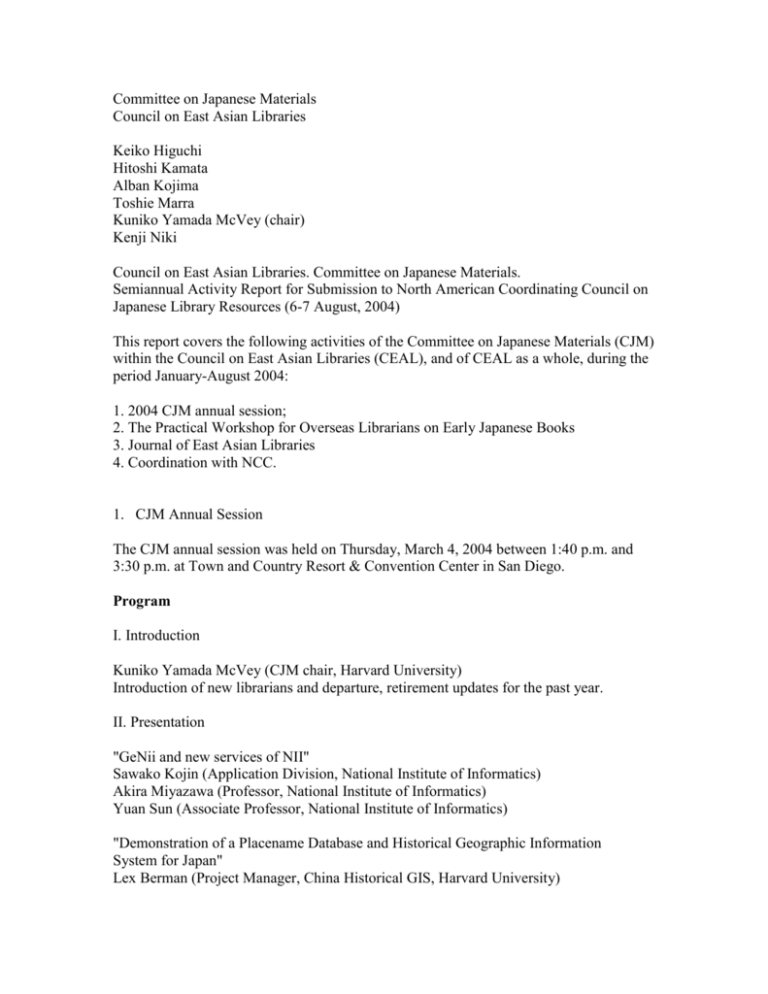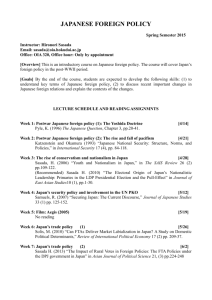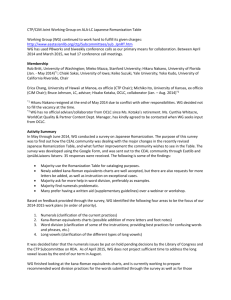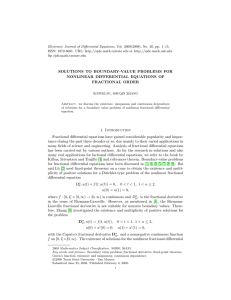5CJMreportAug.04.NCC..
advertisement

Committee on Japanese Materials Council on East Asian Libraries Keiko Higuchi Hitoshi Kamata Alban Kojima Toshie Marra Kuniko Yamada McVey (chair) Kenji Niki Council on East Asian Libraries. Committee on Japanese Materials. Semiannual Activity Report for Submission to North American Coordinating Council on Japanese Library Resources (6-7 August, 2004) This report covers the following activities of the Committee on Japanese Materials (CJM) within the Council on East Asian Libraries (CEAL), and of CEAL as a whole, during the period January-August 2004: 1. 2004 CJM annual session; 2. The Practical Workshop for Overseas Librarians on Early Japanese Books 3. Journal of East Asian Libraries 4. Coordination with NCC. 1. CJM Annual Session The CJM annual session was held on Thursday, March 4, 2004 between 1:40 p.m. and 3:30 p.m. at Town and Country Resort & Convention Center in San Diego. Program I. Introduction Kuniko Yamada McVey (CJM chair, Harvard University) Introduction of new librarians and departure, retirement updates for the past year. II. Presentation "GeNii and new services of NII" Sawako Kojin (Application Division, National Institute of Informatics) Akira Miyazawa (Professor, National Institute of Informatics) Yuan Sun (Associate Professor, National Institute of Informatics) "Demonstration of a Placename Database and Historical Geographic Information System for Japan" Lex Berman (Project Manager, China Historical GIS, Harvard University) "Report of the Practical workshop on Early Japanese Materials at the National Institute of Japanese Literature in Tokyo" Reiko Yoshimura (Librarian, Freer Gallery of Art, Smithsonian Institution) Hitoshi Kamada (Librarian, University of Arizona, CJM member) "An exploratory approval plan for Japanese materials: a case study at the University of Arizona Library” III. Wrap-up;Questions /Answers Each CJM member took a role in supporting the session. A final session report is posted on the CJM web site at http://www.library.arizona.edu/user/hkamada/CJM/cjmhome.html. 2. The Practical Workshop for Overseas Librarians on Early Japanese Books This intensive workshop took place at the National Institute of Japanese Literature (NIJL) in Tokyo for one-week in February 2-6, 2004.The sessions were offered by the NIJL faculty members and were specially designed for Japanese studies librarians working outside Japan. With its core topic centered around Early Japanese books, the workshop had four primary sections: Fundamentals, Bibliographic Description, Conservation, and Cataloging.19 librarians from US participated while six librarians were from Belgium, Germany, Singapore, and the UK. At the feedback session in the end, many participants expressed their sincere appreciation of the workshop and in-depth subject expertise of instructors. This first workshop for overseas librarians were originally initiated by Sachie Noguchi a few years ago and CJM’s subcommittee on Japanese Rare Books has been instrumental for making this happen. We are very pleased by the recent announcement that NIJL will offer the second workshop in next February. 3. Journal of East Asian Libraries At the Plenary Session of the annual meetings of the CEAL March 3, 2004, President Abraham Yu announced the formation of a Special Committee to consider the question of whether or not the Journal of East Asian Libraries should become a peer-reviewed journal. The issue was discussed during the Executive Board meeting in San Diego And the committee was asked to further examine the issue and make recommendations. The Special Committee reported the survey result to the Executive Board with following recommendations in late May. 1. Journal of East Asian Libraries should become a peer-reviewed journal. 2. The journal should be made up of two sections: peer-reviewed articles, and a section for reports, news items, personnel notices, obituaries, and so on, which would not be peer-reviewed. 3. Articles submitted for consideration for publication would be reviewed by no less then two of a panel of reviewers made up of East Asian librarians and other East Asian scholars. If necessary, an outside expert would be invited to review an article outside the scope of expertise of the panel of reviewers. Review would be blind and anonymous. 4. Until the review process is firmly in place and the transition smoothly made, the Journal shall remain a print journal in its entirety (both peer-reviewed and non peerreviewed sections). 5. An Editorial Board to set direction and screen of articles should be established. The Editorial Board should reflect the subject and professional expertise of the various committees of CEAL. 6. The Journal should move to publication twice a year. The Executive Board has not reached the final response to these recommendations yet. 4. Coordination with NCC As always CJM stayed in close communication with NCC in its planning for the 2005 CJM annual session. This practice not only helped avoid redundant contents but also enabled us to make both programs complement each other. CJM continues to seek to maintain a good working relationship with NCC.








